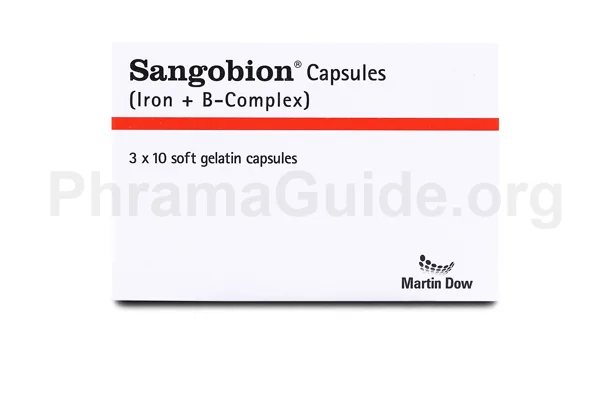Sangobion Capsule is a multivitamin and mineral supplement that contains iron and vitamin B complex. It is primarily used to treat and prevent iron deficiency anemia, a condition in which the body does not have enough red blood cells. The following are some common uses of Sangobion capsule:
- Fatigue and Low Energy Levels
- Nutritional Support
- Increased Iron and B Vitamin Requirements
- Nervous System Function (Improved Cognitive Function)
- Skin, Hair, and Nail Health
- Enhancing Physical Stamina
Off-label Uses of Sangobion Capsule
Sangobion Capsule is also used for people who are pregnant, breastfeeding, or menstruating.
Sangobion capsules can also be used for people who have certain medical conditions, such as Crohn’s disease, ulcerative colitis, or celiac disease, which can interfere with the absorption of iron.

What is Sangobion?
Sangobion is one of the leading brands with the combination of Iron + Vitamin B Complex, manufactured and marketed by Martin Dow Marker, Pakistan.
Sangobion Alternatives : Other Similar Brands
The following are Some Alternative Brands of Sangobion and Their Manufacturers.
Fefol Vit : GlaxoSmithKline (GSK).
Sangobion : Available Formulations and Strengths
Presently, Sangobion is available in Capsule (Soft Gel) and Syrup Forms with the following strengths.
Sangobion Each Capsule Contains:
- Vitamin B12: 7.5mcg
- Vitamin C: 50mg
- Folic acid: 1.0mg
- Ferrous gluconate: 250mg
- Sorbitol: 25mg
- Manganese sulfate: 2mg
- Copper sulfate: 2mg
Sangobion Syrup Each 5ml Contains:
- Biotin: 300mcg
- Nicotinamide: 15mg
- Vitamin B1: 1mg
- Vitamin B2: 1mg
- Vitamin B6: 1.5mg
- Ferrous gluconate: 129.5mg
Who Should Not Use Sangobion?
Sangobion is generally considered safe for most individuals when taken as directed. However, there are a few contraindications and precautions to consider.
- Hypersensitivity or Allergy: Individuals who have a known hypersensitivity or allergy to any of the active ingredients in Sangobion should avoid its use. Allergic reactions can range from mild to severe and may include symptoms such as rash, itching, swelling, difficulty breathing, or anaphylaxis.
- Iron Overload Conditions: Sangobion should not be used in individuals with iron overload conditions, such as hemochromatosis or hemosiderosis. These conditions involve excessive accumulation of iron in the body, and additional iron supplementation could worsen the condition.
- Hemolytic Anemia: Sangobion is generally not recommended for individuals with hemolytic anemia, a condition characterized by the destruction of red blood cells at a faster rate than normal. The increased breakdown of red blood cells may lead to elevated levels of iron in the body, making additional iron supplementation unnecessary or potentially harmful.
- Thalassemia: Thalassemia is a genetic blood disorder that affects the production of hemoglobin. In some cases, individuals with thalassemia may have iron overload due to frequent blood transfusions. The use of Sangobion should be carefully evaluated in such cases to avoid exacerbating iron overload.
- Certain Genetic Conditions: There are certain genetic conditions, such as primary hemochromatosis or aceruloplasminemia, in which iron metabolism is impaired. Sangobion is not recommended for individuals with these conditions.
What is the Recommended Daily Dosage of Sangobion?
Sangobion Dose for Adults:
- One Capsule, once a day.
- Take Sangobion with or after a meal.
How Sangobion Works?
Each ingredient of Sangobion plays a distinct role in the body.
Iron: Iron is an essential mineral involved in several important processes in the body. Its primary role is in the production of hemoglobin, the protein in red blood cells that carries oxygen from the lungs to the tissues. Iron is also a component of various enzymes involved in energy production, metabolism, and DNA synthesis.
When taken orally as part of an iron supplement, iron is absorbed in the small intestine and transported through the bloodstream to various tissues and organs. Once inside the cells, it is utilized in the production of hemoglobin and other iron-dependent enzymes.
B Complex Vitamins: B complex vitamins are a group of water-soluble vitamins that play crucial roles in numerous bodily functions. The B complex typically includes thiamine (B1), riboflavin (B2), pyridoxine (B6), biotin (B7), folate (B9), and cobalamin (B12). Each B vitamin has its specific functions, but collectively, they contribute to energy metabolism, nerve function, DNA synthesis, red blood cell production, and the maintenance of healthy skin, hair, and nails. B complex vitamins are involved in various enzymatic reactions and serve as co-factors or coenzymes, supporting vital processes in the body.
When taken as part of a B complex supplement, these vitamins are absorbed in the small intestine and distributed throughout the body. They participate in numerous metabolic reactions, including the conversion of carbohydrates, fats, and proteins into energy, the synthesis of DNA and red blood cells, and the maintenance of nerve function.

Leave A Comment